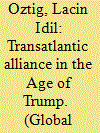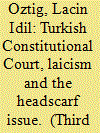| Srl | Item |
| 1 |
ID:
174082


|
|
|
|
|
| Summary/Abstract |
The delegation of authority to private companies in the security domain has certain advantages for states. It optimizes security, lowers costs and eschews accountability. The aim of this article is to examine the implications of the increasing role of private security companies within, at and beyond the borders of state sovereignty. This article argues that the growing power of private security companies in the prevention and the regulation of unauthorized flows of people and goods produces contradictory tendencies for state sovereignty. As private security companies fulfil roles that were previously under the exclusive authority of state actors, states have lost their exclusivity with respect to their coercive and performative roles. Yet, the privatization of security is the result of the calculated decisions of state actors to increase their coercive power against unauthorized border crossers. Even though states’ sovereign exclusivity is being weakened with the privatization of the security domain, both state and private actors work towards strengthening states’ sovereign authority by excluding and deterring unauthorized movements of people and goods.
|
|
|
|
|
|
|
|
|
|
|
|
|
|
|
|
| 2 |
ID:
167916


|
|
|
|
|
| Summary/Abstract |
From Syria's independence in 1946 until the 1998 bilateral crisis, Turkish‐Syrian relations were characterized by hostility and mistrust. Not least in their uncooperative border interactions. In the 1950s, Turkey was concerned about the illegal transfer of goods across its Syrian border. In the 1980s and 1990s, preventing PKK (Kurdish Workers' Party) activities became Turkish policy makers' top security priority. Ankara even went so far as to plant landmines along the Syrian border.
|
|
|
|
|
|
|
|
|
|
|
|
|
|
|
|
| 3 |
ID:
174606


|
|
|
|
|
| Summary/Abstract |
NATO has successfully adjusted itself in the political and security environment of the post-Cold war era through enlargement, focusing on conflict prevention, crisis management and peacekeeping. Currently, the most important challenge to NATO comes from within. Under businessman-turned-U.S. President Donald J. Trump who focuses his attention on ‘making America great again’, the issue of burden sharing has dominated NATO’s agenda. President Trump has pressured European countries to increase their defense spending to meet the 2% of GDP defense spending objective of NATO. While the previous U.S. presidents also pressured European states with regard to burden sharing, President Trump’s rhetoric differs from his predecessors by associating American commitment to the Alliance directly to the defense spending of NATO’s European members. Importantly, this article shows that despite Trump’s skepticism of NATO and his rhetorical pressure on its member states regarding the issue of burden sharing, there is no change in the American approach to NATO at the policy level.
|
|
|
|
|
|
|
|
|
|
|
|
|
|
|
|
| 4 |
ID:
158923


|
|
|
|
|
| Summary/Abstract |
From 1989 onwards, the Turkish Constitutional Court justified the headscarf ban in universities by citing laicism. Interestingly, in 2014, the Court found the headscarf ban in courts unconstitutional and revoked it by again citing laicism as the main reason. How can this seemingly paradoxical practice be explained? This article traces the trajectory of the headscarf issue in Turkey by analysing and contextualising the Constitutional Court decisions. In order to explain how and why the Constitutional Court issued two opposing views of the headscarf ban, this article focuses on the changing political climate and legal developments that took place in Turkey between 2008 and 2014.
|
|
|
|
|
|
|
|
|
|
|
|
|
|
|
|